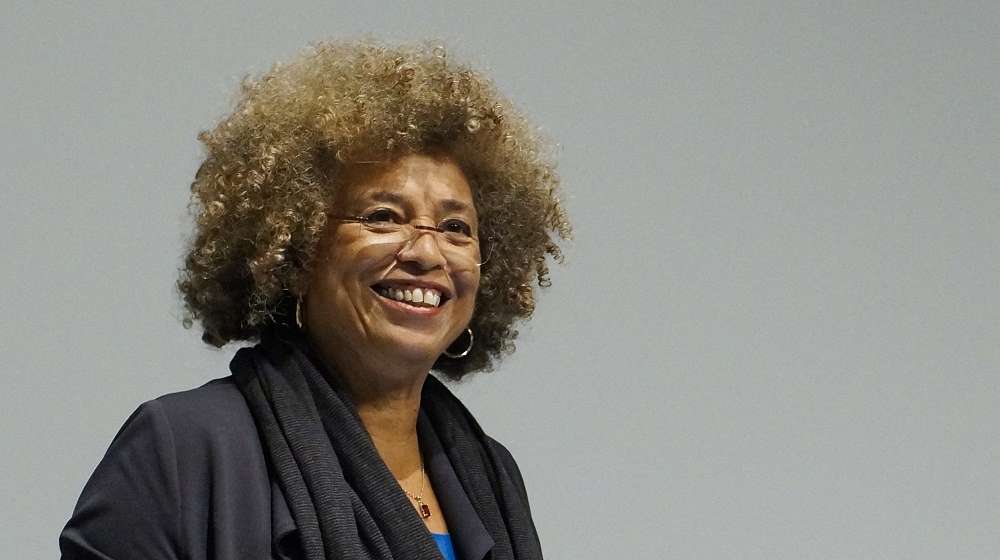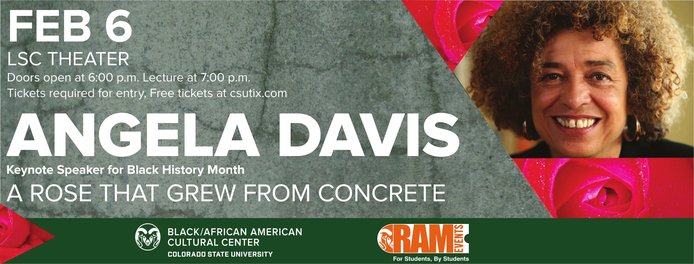A keynote speaker for this year’s Black History Month celebration at CSU is Angela Davis, political activist, academic, and author.
“We are very excited to have Angela Davis be our guest speaker,” said Bridgette Johnson, director of the Black/African American Cultural Center. “She’s going to add a dimension to campus that we have not had before, which is especially important in these times we’re living in, and considering how much work stills need to be done when it comes to social justice, equity and inclusion,” (SOURCE).
So many people wanted to attend the event, they’ve opened a second location where attendees can watch a simulcast. Get yours at www.csutix.com! Tickets are required, but FREE. You DO NOT want to miss this!

Born in Alabama, Davis attributes much of her later political involvement to her involvement as a young girl in Birmingham with the Girl Scouts of the United States of America. As a Girl Scout, she protested racial segregation in Birmingham. As a teenager, she organized interracial study groups that were broken up by police. “I grew up in the southern United States in a city which at that time during the late ’40’s and early ’50’s was the most segregated city in the country, and in a sense learning how to oppose the status quo was a question of survival.”
Davis was awarded a scholarship to Brandeis University in Waltham, Massachusetts, where she was one of three black students in her freshman class. While working towards her degree, completing her junior year studying abroad in Paris, she learned of the bombing of a church in Birmingham that killed four black girls, some of whom she knew personally. The tragedy only fueled her growing activism. She studied French as an undergraduate and went on to do her graduate studies in philosophy, which she completed in part in Germany, eventually earning her doctorate.
In the 1960s, Davis was involved in the Civil Rights Movement. She was considered a counterculture activist and radical, a leader of the Communist Party USA (CPUSA) and associate of the Black Panther Party. In 1969 California Governor Ronald Reagan attempted to have her banned from teaching at any university in California because of her connection to the CPUSA. He didn’t succeed (although she was fired from her teaching position for a short time, later reinstated). As a professor at University of California, Santa Cruz, (she’s since retired), Davis was part of its History of Consciousness Department and a former director of the university’s Feminist Studies department. “I decided to teach because I think that any person who studies philosophy has to be involved actively.” Her research interests include feminism, African-American studies, critical theory, Marxism, popular music, social consciousness, and the philosophy and history of punishment and prisons.
Davis is the co-founder of Critical Resistance, an organization working to abolish the prison–industrial complex. She spent time herself in prison, having been accused of “aggravated kidnapping and first degree murder in the death of Judge Harold Haley.” When charged, FBI director J. Edgar Hoover listed Davis on the FBI’s Ten Most Wanted Fugitive List. When she was imprisoned, across the nation thousands of people began organizing a movement to gain her release. After 16 months of incarceration, she was released on bail and eventually found not guilty.
After her release, Davis went on an international speaking tour. She has written several books, such as “Women, Race & Class” and “The Meaning of Freedom,” with a particular focus on advocating for gender equity and prison reform. Davis has lectured at Rutgers University, San Francisco State University, Stanford University, Smith College, Bryn Mawr College, Brown University, Syracuse University, and other schools. As most of her teaching is at the graduate level, she says that she concentrates more on posing questions that encourage development of critical thinking than on imparting knowledge. In 2017 Davis was a featured speaker and made honorary co-chair at the Women’s March on Washington.
Today’s CSU Black History Month Event: “A Few Black Inventors Who Changed the World,” drop in 10 a.m. to 2 p.m., LSC 328-330
